Dreaming of an ocean‑front “I do” in 2025? Here’s a brutally honest breakdown of Western Cape vs KwaZulu‑Natal venues so you can make an informed decision (before thousands go on décor and sneaky permit fees).
The Beach Wedding Dream vs. Coastal Reality
A beach wedding calls to mind barefoot brides, sunset walkways, and soft ocean breezes. It’s Instagram‑perfect in concept, relaxed, romantic, budget‑smart.
But anyone who’s run sand through a pair of heels knows the beach bar vibe doesn’t come without thorny logistics:
-
Permits & bylaws: Most public beaches require municipal approval. (No permit = no ceremony.)
-
Weather surprises: gusty wind on the Atlantic side or humidity and bugs on the Indian Ocean coast.
-
Noise & privacy issues: waves drown out sound, and public beaches = unpredictable foot traffic.
-
Vendor challenges: transporting gear across dunes, generator needs, and finding reliable local teams.
So let’s dig into the two leading coastal provinces where most couples are drawn for their “wedding‑day forever” shots… and sometimes, one too many course corrections.
Western Cape Coastal Venues: Gorgeous, but Demanding
📍 Popular Picks
Camps Bay, Llandudno, Noordhoek, Hermanus‑area beaches like Grotto, and Paternoster Coast make the top list due to dramatic mountain‑by‑sea views and upscale nearby venues.
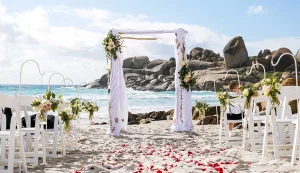
-
The Bay Hotel in Camps Bay, for example, offers a full beach‑wedding package including beach gazebo, planner, photographer, but enforces strict no‑alcohol policies on the public sand area and helps with permits from the City of Cape Town. (thebayhotel.com)
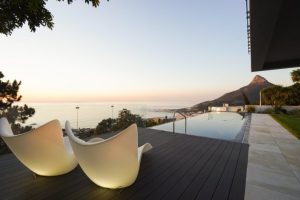
-
Camps Bay Retreat Boutique requires exclusive property booking and no more than ~50 guests on the actual sand strand for exclusivity.(campsbayretreat.com)
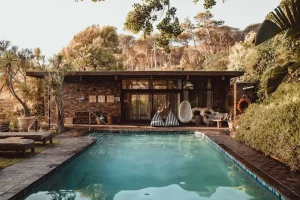
Pros
-
Photogenic vistas: Table Mountain backdrop + wide white sand—perfect light, year‑round.
-
Reliable vendors: Cape Town is wedding‑central in SA; planning companies, photographers, caterers, transport and packing are premium and plentiful.
-
More settled flow of guests: Domestic/international flights into Cape Town more frequent and accessible.
-
Cool, dry summers: Most weddings held between late October and early April for warm sun and minimal rain.
Cons
-
Wind worries: The notorious Cape Doctor can roar through midday; March–April may offer calmer weather but still requires contingency.
-
Cold Atlantic Ocean: Most people in Turks or floaties once snapping toes. Swimming is not the highlight.
-
Permit hurdles: You’ll need a permit for most public beaches; costs vary from R 300 – R 6 000+, must be filed at least one week in advance; no guarantee of exclusivity.
-
Premium pricing: High demand means bookings open a year in advance and prices rise sharply during December – January.
What to Consider
-
Latest Cape Town bylaws require environmental & noise clearance for weddings above 50 guests.
-
Access for elderly/elderly‑mobility guests can be tricky on dunes. Many vendors offer beach‑accessible walkways and portable platforms, ask in venue tours.
KwaZulu‑Natal Coastal Venues: Warm, Lush and Season‑Sensitive
📍 Well‑Known Spots
Umhlanga Beach (Oyster Box, Umhlanga Rocks Hotel), Ballito (Salt Rock, Sala Beach House, Baron Beach House), Southbroom, Zinkwazi Beach, and Kosi Bay are popular for their tropical backdrops and warmer water.
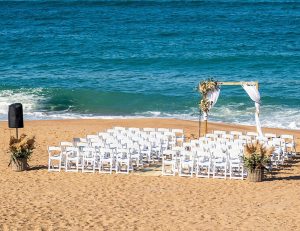
- Oyster Box Hotel offers classic ocean‑front ceremonies with Indian Ocean breezes and wedding planners behind the scenes. Reviews like:
“If you’re thinking of getting married at OBH, do it, it’s a once in a lifetime experience … Ginny Eslick is the best wedding planner ever.” (tripadvisor.com)
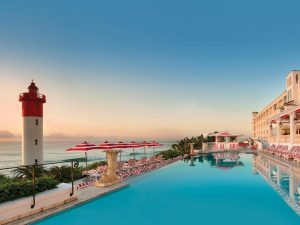
-
Baron Beach House in Umhlanga prides itself on being “relaxed without being rustic… upmarket without being pretentious. We marry ‘ballgowns and flip flops’” for the boho‑beach vibe it delivers (theumhlangamagazine.co.za).
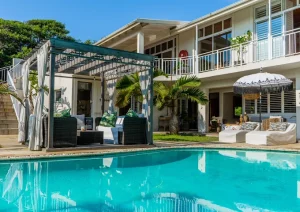
Pros
-
Indian Ocean heat: Seawater typically registers ~23–27 °C → great for photos, guests and babes alike.
-
Tropical greenery & flowers: Indoor/outdoor venue lines fade in lush coastal trees and modern beachfront resorts.
-
Year‑round warmth: Mild winters (16–24 °C average in May–September; Durban rainfall ~56 mm to ~35 mm).
-
Lower baseline pricing: Still cheaper than Cape Town premium—even resort‑tier hotels like Ballito stretch staff rates predictably lower. saltrockbeach.co.zasalabeach.co.za.
Cons
-
Humidity + bugs: December through February days can reach 28–32 °C highs with high humidity. Mosquitoes and sand flies may appear in beachfront evenings.
-
Rain risk: KZN’s rainy season peaks between November and April (November ~102 mm average in Durban)
responsiblevacation.com, weather-and-climate.com. -
Occasional storms: Cyclonic activity in coastal KZN can force disruptions in January or early February.
-
Infrastructure hiccups: While sustained load‑shedding has dropped by 2025 (!), outages remain possible during peak summer demand, backup generator planning is smart.
-
Vendor variety: Fewer specialist planners or photographers compared to Cape Town, though most resorts partner with local suppliers.
What to Consider
-
Durban eThekwini municipality requires a wedding permit for public beachfront ceremonies (though many resorts use private beachfront areas), and offshore marine parks (e.g. iSimangaliso) require 10 working days for permit processing, no permits issued in high‑season summer school holidays
isimangaliso.com. -
Some venues cut power out of necessity too, ask how much generator backup you’ll need in March/April.
-
Transport: King Shaka Airport (Durban) to Ballito/Umhlanga takes 30–40 min by car. For smaller towns like Zinkwazi or Kosi Bay, budget a 3–4‑hour transfer by road.
Key Practical Considerations
| Consideration | Western Cape (Cape Town region) | KwaZulu‑Natal Coast |
|---|---|---|
| Permits & Authority | City of Cape Town (1 week+) – public beaches cost R 300–R₶ 6000. For protected areas (SANParks), submit to SANParks as well Pink Book Weddingscapetown.gov.za | EThekwini Municipality (public sites). iSimangaliso and other nature reserves need 10 working days permit, not accepted during school holidays isimangaliso.com |
| Best Weather Timing | Late Oct–Apr (warm, lower rain), calmest Mar–Apr; Oct and Nov shoulder season special rates Pink Book Weddings | May–Sep is warmest + driest, but hotel‑rates rise. Summer (Nov‑Apr) hotter/rainy, plan indoor or shade back‑up |
| Guest Access | Flights into Cape Town, superb infrastructure, many pet‑friendly and large‑hotel options | Flights to Durban, then limited connections north, Ballito/Umhlanga are well served |
| Vendors & Services | Virtually unlimited planners, photographers, cake bakers, rentals | Resort packages help; fewer standalone vendors, early booking advised |
| Backup Plan | Mandatory due to wind/rain risks, tents or indoor backup essential | Backup for late‑season storms and electricity drops is recommended |
| Budget Expectation | Higher per‑head costs during peak season; downward in Mar/Apr | Generally better value; all‑inclusive packages with minimal add‑ons |
| Water & Climate | Atlantic waters ~16–20 °C; windy; photos at golden hour more forgiving | Indian Ocean ~23–27 °C; humid; glowing foliage; richer florals, insects possible |
What Real Couples Have to Say
“If you’re thinking of getting married at OBH, do it, it’s a once‑in‑a‑lifetime experience … Ginny Eslick is the best wedding planner ever.”
— Oyster Box Hotel reviewer (TripAdvisor), seen winter 2024 tripadvisor.com
“We are relaxed without being rustic, we are upmarket without being pretentious. We marry ‘ballgowns and flip flops’ … boho beach chic.”
— The Umhlanga Magazine reviewing Baron Beach House weddings, April 2025 Nubian Bride+1facebook.com+1
“Marriage officer here. March and April are good in Cape Town—not too hot, not too windy. Still, every couple should budget for alternative venue.”
— Reddit user, r/capetown (August 2024 thread consulted in spring 2025) reddit.com
Those sentiments echo our guide: both regions sparkle, but each offers reality checks of its own.
Who Wins the Coastal Wedding Battle?
There’s no single winner, just the best fit for your vision, season, and priorities.
-
Chic, polished, and cooler – The Western Cape is ideal if you’ve got a tight timeline (Oct–Apr), want designer coastal views, strong infrastructure, and cold‑water photography magic. Just prepare for stricter permitting and possible wind.
-
Warm, vibrant, and tropical – KZN delivers lush scenery, beach‑swimming comfort, and budget flexibility, particularly if you pick winter (May–September) for drier air and better rates.
Often couples choose Cape Town for dramatic landscape shots plus honeymoon stays at vineyards nearby, and KZN if they want tropical wedding brunches and swimming guests. Keep your season in mind: marrying in peak summer (Dec–Jan) increases rain risk in KZN, while in Cape Town, December is crowded and windy.
Best Tips for Any Beach‑side Couple
-
Lock in your venue 9–12 months ahead, peak summers sell out early in both regions.
-
Apply for wedding permits ASAP, especially earlier in school‑holiday season.
-
Plan a backup (tiers of plan A, B and C: canopy → tent → indoor hall).
-
Beach‑proof your attire & décor, use wind‑rated décor, shoes, and lighting.
-
Ask about electricity and backups, winter 2025 promises low load‑shedding risk, but summer surges and storms still carry outage potential.
-
Visit the beach sites at the planned ceremony hour, preferably at high season, to feel wind/sound/lighting dynamics.
Final Take
-
Western Cape = sweeping vistas, crisp weather (if timed well), and seamless vendor support.
-
KwaZulu‑Natal = warm water, lush vibes, and better baseline pricing, but be prepared for humidity and rain.
Your beach wedding should feel dreamy, not disappointing. Visit in person if you can, envision midday and sunset hours, and align your venue with your guest‑comfort goals and finances. With planning and smart timing, both options can deliver a breathtaking coastal wedding experience.
Featured Image: Canva

